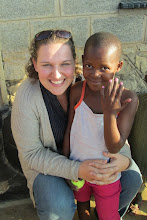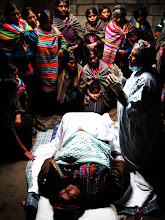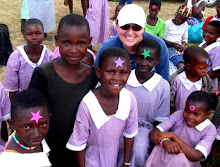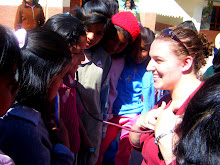We are Peace Corps volunteers. We swat away thatch spiders like flies, fight rats at 3am, start vacations by hiking 10km out of village with overloaded packs, help butcher hogs, and get diarrhea in awkward public places. As my military father would say, we're "hard core." We laugh at the things that make lesser Americans cry... AND yet we were totally unequal to the "adventure" we got ourselves into in Swaziland.
We fancy ourselves rough and tumbly, African adventurers... So when I suggested to 3 of my PCV friends, Will, Amanda, and Zoe, that we go white water rafting in Swaziland during our first vacation over Easter Break, they eagerly jumped on board. "Absolutely! That's awesome!" they regaled. "Should we do a half day or full day trip?" I asked. "Definitely, full day" we agreed. "We're going all the way there... We might as well get our money's worth!"
Boy, did we ever get our money's worth.
I'm going to start with a little background and an observation to put our adventure in perspective: 1) While we may not be as "hard core" as we first imagined, Will, Zoe, Amanda, and I are far from pansies. We'd all been white water rafting in the U.S. multiple times, and are all experienced travelers in our own right. 2) The Swazi Trails rafting company would definitely NOT be legal in America. Seriously. No insurance agency in the U.S. would ever accept the liability for the things we did and saw that day.
Yet the day before Easter, we showed up "wide eyed and bushy tailed" on the bank of the Usutu River in central Swaziland! After all, the website said "beginners welcomed" and there was a completely clueless Irish family of 4 in our rafting group... How bad could this be, right?! We'd only been there 10 minutes, however, when we came to a startling realization- "Oh. Okay. Those AREN'T 6 man rafts... Two people per raft? But where does the guide go?" we all nervously chuckled as the Safety Briefing started. "It's fine!" Amanda and I (my rafting partner for the day) told each other, "We've got this!"
Our rafting guide for the day was a tall, incredibly muscled, and hilariously outspoken, black Swazi man named Beke... And his light, laid back attitude and affable nature, immediately put us at ease. His safety briefing (to people who, remember, were all assumed to be "beginners") went something like this:
Beke: "So this is a paddle. You put THIS end in the water." *Cue the nervous laughter* "The person in the back of the boat steers, and is likely to get launched into the rapids... So you should put your feet in these straps." *Nervous glance between Amanda and I*
ME:
"Well crap," I think. "Which one of us wants to go swimming."
Beke: "We really do want you to TRY to stay in the raft, if possible. But if you do fall out, get back into the boat as fast as possible... Oh, and watch out for crocodiles."
ME:
"Holy hell... What am I doing here?!"
Beke: "Before some of the larger falls, we'll ask you to pull to the side of the river, so we can assess the rapid and discuss your point of entry."
ME:
"Whoa, there buddy! What's so complicated or dangerous that it needs a pre-rehearsed 'plan of attack'?!"
Beke: "Okay, great! So grab your partner and let's go!"
ME:
"WAIT just a second there, hot shot!... I think you might've missed a few steps??" *Gulp*
Amanda and I exchanged nervous glances- "Its fine! Were Peace Corps Volunteers! We've got this!" In retrospect, we said that to ourselves a lot that day. But we reassured ourselves it would be fine, and after a little discussion we decided that Amanda, who had had a total of one rafting trip more experience than me, would start in the "hot seat" position at the back of the boat steering. "We'll just try it and see how it goes," I told her. "I'll take over and try, if it doesn't work."
Guess what? It didn't work.
Not 15 minutes into our day trip we pulled over to inspect the first set of "falls," a 5 meter drop over a damn wall. By this time, Beke had jokingly named Amanda and I his "Special Ed" group, a label we readily owned up to. So as such, we were one of the last rafts to traverse the damn... Over we went with an exhilarating plunge! On the other side, I shouted in triumph, "Whoohoo! We did it!" But my excitement was short lived. In front of me, I saw Beke frantically waving. "TURN AROUND!" he screamed.
"What?" I thought as I turned to look behind me. Surprise, surprise... The second half of my two man rafting team was flailing for help in the rapids behind me.
"Just great," I thought.
After Amanda's first dunk in the Usutu, we quickly came to the conclusion that I, the heavier of the two of us, had to be in the rear. Otherwise, poor Amanda was going to go sailing at every bump. So, in the words of my dad again, I "manned up." I climbed in the dreaded "hot seat" and hunkered down to face the next 15 km of river.
If Amanda and I were the "Special Ed" group, then Will and Zoe were the over achieving, "Accelerated Learners." With Will expertly steering their raft, they were the first through nearly every rapid... Laughing at the lurches Amanda and I seemed to get into around every corner. Now, while I was no "Will" at guiding our raft, we survived about 5km of rapids with no more major accidents... And by the end of the morning, we were having a great time and really getting the hang of it! Until we came to the "big one."
Just before lunch, our guides asked us to pull to the side so that we could inspect our last rapid of the morning. We pulled to the side, happy for a short break from paddling, and climbed ahead about 50 meters to look at the rapid.
"Oh, crap... They have got to be kidding!" I thought the instant the falls came into view. We were standing looking at a massive bottle-necked drop in the river. The fall that started the relatively short, but incredibly ferocious length of water, was about a 5 to 10 meter drop. At the base of that fall, the tight corners between the towering rock walls on either side, created a series of about 3 massive, churning waves that seemed to move the water violently from one wall to the other in a zig-zag pattern. They said it was a Class 4 rapid.
"Like heck, that's a class 4!" I thought.
"I've been down a class 4 rapid before, and it was NOTHING like this!"
And apparently this was a rapid that did require a pre-discussed plan of attack:
Beke: "Okay, Mary Beth- So the water's a little high today, but no big deal! Here's all you have to do... Give it lots of speed going in, but you HAVE to hit that 'v' in the water straight on. You go over side ways and it's all over" he said, with a much-too-nonchalant laugh.
ME:
"Wait a second! WHAT's all over???" I thought.
Beke: "As soon as you hit the top of the fall, you want to hard stroke on the left, otherwide you're gonna crash straight into that rock face. Okay?"
ME:
"Oh my god. Seriously?! I take it back... I'm really not that hard-core. I was afraid of little spiders until I joined Peace Corps!"
Beke: "So after you're down the fall, give it two or three good strokes on your right, because there's a large rock the water's flowing over there," he said, pointing to some vague, yet crucial, spot of non-descript water. "Okay- And that's really all there is to it!"
ME:
"I am DEFINITELY not qualified to do this."
Now I have to give Amanda credit... Up until the moment we hit that fall, she had been the picture of positive energy and encouragement. "You can do this!" she reassured me as we paddled out into position. "We're Peace Corps Volunteers, right?!"
The next 30 seconds are a blur of furious paddling, crashing waves, and frantic praying. We plunged over the fall, and over the entire raft flipped with a startling amount of force. Before I could process what had happened, I was being tossed about helplessly beneath ferocious waves of white-water. I remember the panic that set in the moment I realized,
"Oh my god- I don't know which direction to swim in!" The swirling water made it impossible to tell which way was up. A second later, I felt something hard and heavy pushing my head under, with each violent wave- The overturned raft was on top of me, preventing my access to much needed air. I finally wrestled myself free of it, and managed to find the surface, after a few terrifying seconds that felt like an eternity.
"Remember- Keep your feet up and lie on your back" I told myself, assuming the safety position Beke had lectured us on. As oxygen slowly returned conscious thought to my brain, I whipped around in search of Amanda. Much to my relief, I saw that she was already being pulled ashore up-river by a guide. I, on the other hand, was quickly being sucked down-river, all the while fighting the pressing weight of the overturned raft at my side. Before I knew it, a guide was at my side in a kayak. "Get back in your raft NOW." he said with urgency.
"Okay... Okay" I thought irritated.
"Give me two seconds to catch my breath, will you?!" I began to flip the raft, and attempt the strenuous process of hauling myself back in. Now these two things were no easy task when I had a partner and was floating in calm water- But here, alone, breathless, and in churning water, they were nearly impossible. "You HAVE to get in NOW." the guide said again with insistence. "I'm trying!" I yelled, aggravated. "I don't think you understand..." He said, with a touch of fear in his voice. "You NEED to get in that raft NOW!" He moved his kayak to help pull me into the raft, but before I had even righted myself enough to grab my paddle and think, he was urging me to action again. "Hurry!" He yelled. "You have to get to shore NOW! There's a waterfall!!!"
"A WHAT?!" I gasped.
"I am so not hard core enough for this," I thought. "You're being sucked in by a waterfall 100m down river! You have to get to that bank!" he yelled. I paddled frantically, but exhaustion and strong currents made my efforts to maneveur the large raft by myself, nearly pointless. I barely missed the embankment where Will and Zoe had pulled up their raft, and were anxiously watching this terrifying series of events unfold. "There's a waterfall!!!" the guide continued to scream.
"Thank you, jerk! So I've been told!... You're REALLY not helping the situation!!" I thought, as my terror transformed into anger. At the last second Will, anchored only by placing his feet firmly in his own raft, launched out to grab my arm. As he pulled against the immense force of the water sucking me towards the waterfall, I started to come out of my seat. It was a split second decision- Either let the raft go, or go with it. I chose to let the raft go.
Into the water I went, yet again, as Will hauled me up onto a rocky embankment. In retrospect, Zoe and I laugh at the hilarity of the situation- The guide screaming "Waterfall! Waterfall!" uselessly in the background, and me being forcefully dragged ashore like a beached whale. Ha! Some kind of "hard core" PCVs we are, right?!
In the end, I was lucky to make it out with only a couple of cuts and scrapes, and a few lovely "black and blue" bruises. It was definitely not the worst injury of the day- One guy in our group walked away with a bloodied face and nose. Of the 4 of us PCVs, Zoe was the only one who managed to stay in the raft through that set of rapids. And as we later hauled our rafts down river, around the "waterfall", we understood the guide's panic and fear: It was a legitimate WATERFALL. I'm not sure of the height, but as an example, several of the guides went "cliff jumping" off of it later that day! And I almost went right over it... Raft and all.
We breaked for lunch right after "the big one," and Amanda and I were in desperate need of a few minutes to pull ourselves together, and calm our shaky hands. To put it lightly, our nerves were shot... And we still had 7 to 10 more km of river to survive! YET while we definitely weren't as "hard core" as we'd imagined, we are still Peace Corps Volunteers. And we are nothing, if not resilient. Despite our massive trepidation and exhaustion, Amanda and I suited back up and got back into that raft.
I wish I could say that the rest of the trip was a piece of cake, but it wouldn't be a true adventure without some more drama! Ha! Not 20 minutes after getting back on the river, I yet again found myself being launched into the rapids. That time, I think it shook poor Amanda up more than me. My head bobbed up, gasping for air in the overwhelming waves, just long enough to see her panic-stricken and helpless face screaming for me from the raft. Needless to say, we were both at our wits end by the time I dragged myself back into the boat. So at some point after that, we got smart and did some rearranging so that both Amanda and I could take a turn in the front of Will's, expertly maneuvered raft. We needed a break. The moment I finally relinquished the "hot seat" to a very apprehensive Zoe, was the happiest moment of my whole day! Ha! Poor Will managed to endure our shaken nerves with patience and incredible calm. "Mary Beth- Just STOP paddling" he urged me while laughing. "Seriously- You're not helping. I've got it." And he was totally right. That man got us through km after km of rapids with almost no help. Having had his job as "navigator" for the past 6 hours, I was in awe at how easy he made it look! "Sooo maybe ONE of us IS hard core, after all." I laughed.
Together, the four of us finished our trek down the Usutu River, in one piece. It was an amazing bonding experience, and I know we'll remember it for years to come! At the end of the trip, the rafting company had a cooler full of much needed and appreciated beers... I don't think anything has ever tasted so good! The next day we were all unable to move thanks to bruised and over-worked muscles, but I honestly wouldn't have changed a thing. It was an occasionally exhilarating, totally nerve-wracking, and absolutely memorable adventure in Swaziland!
With love from Lesotho- Mary E.


















